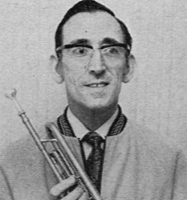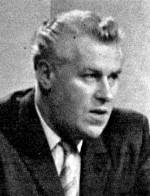Freddy Clayton
On conductors

On Irving Berlin
On George Gershwin
On conductors
Reminiscing in 1989
A session player, by the very nature of things, has (or had) as varied a life as it is possible to get in this profession of ours. Having been fortunate enough to have been around when there seemed to be more good work around than there were good players, many of us found the “three sessions a day, seven days a week” routine perfectly normal. Decca recording studios in the morning, Denham film studios in the afternoon, and a BBC broadcast at night was a normal day’s work for the guys and dolls doing studio work. In other words, Tom Jones, “Carry On Nurse” and Old Tyme Dancing caused us no loss of sleep; it was fairly average. But if the work was varied, so were the conductors, and thereby hangs a tale (I wish I’d written that!).
Conductors can be said to fall into three categories:
- Nice guys who are totally incompetent
- Competent guys who are anything but nice
- Nice guys who are also totally competent.
There is a fourth category, but adding the phrase “certain something” to the “nice and competent” hardly does credit to those who come into this category.
Still. it may be that it will have to suffice, such is your writer’s lack of expertise at literary expression. It is a bit like trying to describe genius: the best thing you can do is to give examples and let the reader work it out for himself (or herself). Needless to say, your writer has worked with those who come into these categories, and it must be stated here and now that the first of the foursome existed, in the main, pre-war. They were the ‘personality” characters of the day who could stand in front of a show band and get away with their sheer dynamic sparkle. It certainly served its purpose, and they are still remembered with affection by many.
Their demise can be put down to the fact that after the war, when the studios—recording, film and television—got into full swing, the monies involved were such that there was just no longer a place for the bandleader who couldn’t take the orchestra through with total professionalism.
Most of the conductors did their own arrangements, and, as a session usually lasted for a duration of three hours, there really wasn’t much time for passengers—either player or conductor. And so the era of the personality came to an end, and in their place came musicians such as Frank Cordell, Eric Rogers, Phil Green and Brian Fahey. All marvellous musicians and all nice guys. They arrived with their own arrangements, took the band through them, and more or less insisted that it was note perfect first time. The fact that they usually got their wish says much for the high standard of musicianship of the day.
But there are one or two conductors who stick in this ex–horn–blower’s memory for one reason or another, and the hope is that the examples given will show, all too adequately, just where the “certain something” comes in.
The legendary BBC Goon Show had my old Geraldo colleague Wally Stott wielding the baton, and it is doubtful if anyone could have done more to make the show the success it was than the lad from Yorkshire. When Spike Milligan’s script called for eight bars of “sea music”, Wally’s efforts were such that the listeners could almost see the Spanish Armada setting sail for this sceptred isle. Another eight bars had them wishing they hadn’t bothered to make the trip! It was all done with the seemingly effortless ease of a letter home to mother, and it was done with a voice to the orchestra that never rose above a mezzo piano. We never heard him in all of the eight happy years of the show raise his voice once.
He is now writing under the name of Angela Morley in Los Angeles for shows such as Dallas and Dynasty, and he has the respect of the musicians not only here in Britain, but also in America. No mean feat. If only they were all like Wally.
The Black and White Minstrel Show lasted 20 years on TV, and again your scribe was fortunate to be associated with this spectacular production. What made the programme so pleasurable was the fact that we had Eric Robinson out front. He, like Wally, had come through the ranks: from playing guitar with the Blue Rockets to conducting not only the Minstrels but also the marvellous Music For You shows takes talent. In the 20–year association we never heard him raise his voice in anger; all in all a credit to the profession.
Our many series with Max Bygraves had another Yorkshire lad wielding the stick, and if they come any nicer than Geoff Love, your writer has yet to meet him. From playing trombone with Harry Gold’s Pieces Of Eight, to becoming Manuel Of The Mountains, and all with a smile that never varied and a heart that seemed to grow bigger with every passing year, Geoff has to be near the top of every session player’s list of favourite people; they don’t come like him every day.
 But
it was my walking into Maida Vale BBC Studios one morning and seeing the
word “solo” written on a particular piece of music that had me oh–so–glad
that a certain Robert Farnon was on the podium. The fixer (that’s the
guy who books the orchestra) gave me his order of the day. “Take the lead
trumpet chair, play the solo part—and remember, this is a television show
so don’t forget to have a shave before the transmission.” Those were his
very words!
But
it was my walking into Maida Vale BBC Studios one morning and seeing the
word “solo” written on a particular piece of music that had me oh–so–glad
that a certain Robert Farnon was on the podium. The fixer (that’s the
guy who books the orchestra) gave me his order of the day. “Take the lead
trumpet chair, play the solo part—and remember, this is a television show
so don’t forget to have a shave before the transmission.” Those were his
very words!
The solo was a nasty one for trumpet: a fairly long wait and then a high entry. Not the most inviting of prospects. As I’d left it a mite late for practising, I looked at my other three colleagues. Although I had their full support, that was all I was getting. There were no volunteers. Just before the actual transmission, a clean–shaven lead trumpet player mentioned to the maestro that there was a slight apprehension about the sixteen bars that lay ahead. “When you stand up, just look at me,” was the advice proffered.
Not exactly the most encouraging of suggestions. A huge orchestra, a lovely young ballerina wending her delightful way through the stands during the number—and a lonely trumpet player nursing the wish that he was somewhere else at that moment.
About eight bars before the start of the solo, I took the first of my ten different embouchures and looked anywhere but at Bob. As the camera zoomed in, I swallowed just once more for luck, tried yet another embouchure, and again kept my eyes away from the man. Two bars before my entry I stood up, managed my final and irreversible embouchure, took a deep breath, felt the slight quickening of the heart and the subtle feel of adrenalin being pumped through the veins—and looked at Bob. It was at that moment I realised the difference between the good conductors and the great ones.
The orchestra, the ballerina, the cameras, the microphones and the several million views were all ignored by the maestro; the only thing in the whole world for him at that moment was me! I had his whole concentration, his whole support and all of his “strength”. It seemed to flow from him in a way that was almost telepathic. A slight smile that never left his lips gave encouragement. A mere shrug of the shoulders had me giving the solo an expression that had been missing from all the times I had played it previously. A slight movement of the wrists brought forth qualities that would never have been there if I had been “on my own”. But it was the eyes that I can remember to this day. They never left me for a second during the solo. They coaxed, cajoled, pleaded, almost as though they were expressing the man’s demands: “Please, just for me . . ” How could anyone not play well with all that going for him? The sixteen bars took approximately 40 seconds to play, and as I sat down I got the briefest nod of approbation from the man.
And then he was gone. Gone to give his all to whoever needed him next. We’ve been friends and colleagues for 40 years now, but the most memorable impression I have of it all is the 40 seconds we spent together one night at Maida Vale Studios, London W9. To have talent is enough for some. To be a gentleman with it is a bonus. But when you add that quality desired by so many and given to so few—a “certain something”—then you have someone very special. That Bob Farnon has all three is without doubt and I feel very privileged to have been a small part of the man’s career. Thanks, Bob.
Copyright © 2000, Jazz Professional. All Rights Reserved.